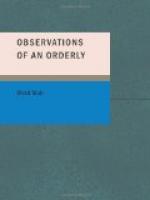Now at Bradford (at the end of one of the chattiest five hours I ever spent in my life) no Mrs. Briggs was perceptible. I kept my patient on the platform until every other passenger had gone: I marched him up and down the main area of the station. Each time I caught sight of a woman who looked a possible Mrs. Briggs I steered my charge into her vicinity. In spite of a piece of information which Briggs had imparted to me on the journey—namely, that he expected soon to become a father—I was surprised that his wife had not come to the station to welcome him. However, it was plain that Briggs himself was not particularly surprised, nor, what was more important, disappointed. Nothing could damp his eternal placidity and good humour. He proposed that from this point onward he should pursue his journey alone. “Nowt to do but git on th’ tram,” he said. “It’s a fair step from ’ere, but I knows every inch of t’ way.” At all events (as of course I could not allow this) he would now act as my guide. And he did. “First to the right.... Now we’re goin’ by a big watchmaker’s-and-jeweller’s.... Now cross t’ street.... Now on th’ corner over there by t’ Sinnemer is w’ere we git our tram.”
The tram in due course appeared, and we boarded it. “Tha mun pay thrippence only, mind,” he warned me when the conductor came round. “It’s a rare long ride for thrippence.” So it proved to be—through wildernesses which were half meadow and half slum, my cicerone at every hundred yards pointing out the notable features of the landscape. On our left I ought to see the so-and-so public house; on our right the football ground—I should know it by the grand-stand jutting above the palings; further on were brickworks; further still a factory which, my nose would have told me, even if Mr. Briggs had not, dealt with chemicals; then, on the skyline, a pit-head; then another; then a mining village with three different kinds of methodist church and two picture palaces; then a gap of dreary, dirty fields. And then, nearing dusk, the village where my friend lived, and where also was the terminus of the tram route.
We quitted the tram and walked down a street of those squalid brick tenements which coal-mining seems to germinate like a rash upon the earth’s surface. The debris and the scaffoldings of pits were dotted about the adjacent countryside. Sooty cabbage-patches occupied the occasional interspaces in the ranks of houses. Briggs directed me across a cinder path in one of these cabbage-patches. “See them three ’ouses at the bottom of the ’ill? The end one’s mine.” We approached. No sign of the wife. Surely she would be on the look-out for her husband? Also there was a sister and a brother-in-law—the latter in a prosperous way of business as a grocer near-by: Briggs had told me of them. Would not they be watching for him? I began to be anxious. Not once, but several times, I had heard of the wounded soldier returning to his home and finding no home: both




